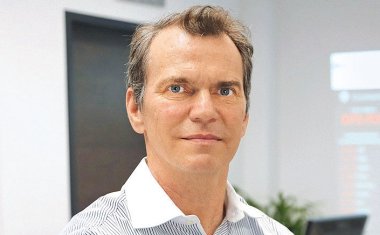Riet Cadonau On the Newly Created dorma+kaba Group
Dorma and Kaba have merged to form the dorma+kaba Group. A global top 3 company in security and access solutions has emerged with a pro-forma turnover of around EUR 1.9b. GIT SECUR...

Dorma and Kaba have merged to form the dorma+kaba Group. A global top 3 company in security and access solutions has emerged with a pro-forma turnover of around EUR 1.9b. GIT SECURITY spoke exclusively with Riet Cadonau, hitherto Kaba CEO and now CEO of the dorma+kaba Group.
GIT SECURITY: Mr Cadonau, there had already been a lot of movement in the access control market during 2015: Dorma and Kaba have got together and risen to third place amongst the market leaders. Shortly beforehand, Allegion and SimonsVoss merged, which made them second largest provider in this segment after Assa Abloy. Will there be further consolidations in this otherwise very fragmented security and access control solutions market in your opinion?
Riet Cadonau: Yes, we expect the trend of consolidation of the market to continue – driven on the one hand by the larger players – but also by inherent necessity that arises from other developments. An example of this would be the need for investment in innovations such as cloud-based solutions, that could overstretch small or medium-sized firms in the medium term.
What course will dorma+kaba take here? Are you considering other acquisitions?
Riet Cadonau: Within the realms of our ability we will also expand and grow stronger through targeted acquisitions. This will follow clearly defined criteria such as strategic fit, technology and geography as well as the respective purchase price.
There has been friendly contact between the companies for many years – but about two years ago you started to talk about a merger. Everything happened quite quickly since the first announcement in April – the new group management is in place, the Kaba shareholders have given their approval, and the competition regulators too. What gave the final impetus to go for the fusion?
Riet Cadonau: A large number of factors have to be in place on comparatively large projects such as this. But the decisive element was the mutual personal trust that was able to develop between those involved. Without this foundation, it would not have been possible to come to a result that is acceptable for everyone. In fact, the key to success lies in simultaneous similarity and complementarity. Even though the Kaba Group is a listed company, just like the Dorma Group we also have a long tradition as a `family-run business‘ with very strong family shareholders. This has led to corresponding similarities in the company culture, the values, etc. On the other hand, we are complementary with regard to the product portfolio, geographical presence in Asia and America as well as our combined capacity throughout the entire value chain.
You stated that you will be better able to serve market and customer needs together through the merger. Where exactly are the advantages of the link between Dorma and Kaba – in what way do the two companies complement each other?
Riet Cadonau: Dorma provides access solutions and the corresponding service and in particular is a leading global provider of automatic, glass and door locking technology. Kaba on the other hand is an important global provider of access control systems, cylinders and locks, time and attendance data collection as well as keys and key systems. But until now, both companies were not able to offer their customers all the products to do with access to buildings – something that is increasingly demanded by customers. This is particularly relevant to the Asia-Pacific and Middle East markets, but frequently also to the developed markets. Within the value chain surrounding doors and thanks to the contacts of Dorma, Kaba products will now be brought into the selection process earlier by architects, planners, main contractors etc. Kaba can also benefit from Dorma‘s design competence. Conversely we can combine the leading technology competence of Kaba in electronic and cloud solutions with the products of Dorma. Together we will become the leading provider of complete access solutions.
And regionally the two companies complement each other, thanks to different global presence?
Riet Cadonau: That‘s true, we also benefit from each other in this aspect. Besides the common strong roots in Europe, Dorma is better represented in Asia, Kaba in contrast in North America. So we not only strengthen our presence in those regions but together also reach a critical mass in many markets.
What effect will the merger have on the future product portfolio?
Riet Cadonau: It is too early to be able to give detailed information about that. Both parties have an intact and healthy portfolio in their relevant areas. We will combine these and develop them further with consideration to future customer requirements.
What plans do you already have – also for differentiation to Assa Abloy and Allegion?
Riet Cadonau: We do not orientate ourselves primarily towards our competitors. The fact is that our customers will profit in future from the combined and largely complementary product portfolios of Kaba and Dorma from one source. We will provide an extensive range of building access products as a `one stop shop’ – we will position ourselves as a provider of complete solutions. We can better reach our customers by combining our sales channels. And we should not forget our combined power of innovation: dorma+kaba will continue to strive for leadership in innovation and will invest around four or five percent of the higher combined turnover in research and development. Our customers will benefit from that too.
Where do you see opportunities for growth for dorma+kaba?
Riet Cadonau: In general, we are luckily in a growth market. Four already recognized megatrends offer us positive business potential. These are urbanization, the growing need for security, technological development – in particular digitalization – as well as growing wealth in emerging markets. As the dorma+kaba Group, we are very well positioned to use these trends more effectively for our growth. In particular, additional growth opportunities arise from the merger to dorma+kaba – for example, through the combination of our product portfolios or our sales structures.
What sales strategy will dorma+kaba follow? More solution-oriented with a portfolio selling approach or segment-oriented and specialized?
Riet Cadonau: We don‘t want to disclose any details on that right now. We are currently in the middle of discussions about the relevant strategic issues. Please also don‘t forget that we have only been able to fully exchange information and work together since 1 September 2015. Before that we kept strictly within the limits set by the competition and cartel authorities.
What targets have you set for yourself for the first year after the merger – what do you want to have achieved for dorma+kaba by then?
Riet Cadonau: We said in our announcement about the merger that we want to create added value for all stakeholders. And we stand to be measured by that. But it will take time. Our first priority is to continue focussing on our customers and partners.The success of the joint projects is high on the list. Apart from that, the first year will be dominated by the merger. So we want to have made all the decisions with regard to structures and communicated these to those responsible by January 2016. The existing organizational structures will be moved into the new structure according to region and country. We plan to have completed this by 1 July 2016. After that we will have advanced in our merger process so far that we can operate together. The actual consolidation, however, will take a further two years.












